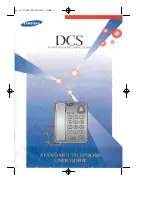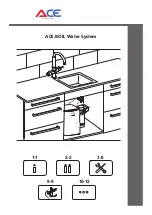
The main objective in conducting a site survey utilizing a
compass and inclinometer is to choose a mounting location
that will give you the greatest amount of swing for azimu t h
and elevation for present as well as future use.A thorough pre-
installation site survey is strongly recommended because it
can alert you to any “look angle”, soil, wind or other problems.
The first and most important consideration when choosing
a p r o s p e c t i ve antenna site is whether or not the area can
provide an acceptable “look angle” to the satellite. A site with
a clear, unobstructed view facing south, southeast, or south-
west is required. Your antenna site must be selected in
a d vance so that you will be able to receive the strongest
signal available. Also consider obstructions that may occur in
the future such as the growth of trees.
P rior to beginning the site survey, the site location and satellite
look angles must be determined. Using the map on Page 12,
the site location by zip code feature of the computer program,
or by other reference, determine your site latitude and longi-
tude. Enter the values here:
Latitude: ____˚N Longitude ____˚W
Based on your site location and the satellite to be used, deter-
mine the correct azimuth, elevation, and skew settings for
your installation. Using the correct tables (beginning on
Page 13), obtain these values and enter them here for easy
reference. If your site location falls between tabulated values,
use the closest location.
Enter the values here:
Azimuth ____˚ Elevation ____˚ Skew ____˚
It is important to conduct an on-site survey with a portable
antenna or with a compass and inclinometer to avoid interfer-
e n c e, obstr u c t i o n s, etc. When selecting “look angle,”
(Elevation/Azimuth) be sure to observe and take readings
approximately 25˚ to the left and right, above and below your
selected “look angle.”
Once you have chosen a site, select a location and determine
the type of installation mount to be used.The satellite antenna
can be installed on a ground pole, wall/roof mount, or non-
penetrating roof mount with 2
³⁄₈
” outside diameter mast. The
chosen mount type should be assembled and in place before
installing the antenna.Refer to instructions packed with mount
for its proper installation. The mast pipe must be vertical
and plumb to insure ease of alignment in accordance
with Section III.
Before any digging or trenching for Interfacility Link (IFL)
c a bles is done, info rmation regarding the possibility of
underground telephone lines, power lines, storm dra i n s, etc., in
the ex c ava t i o n area should be obtained from the appropriate
agency.
As with any other type of construction, a local building perm i t
m ay be required before installing an antenna. It is the propert y
owner’s responsibility to obtain any and all permits.
I.
PRE-INSTALLATION CONSIDERATIONS
DESCRIPTION:
The 75cm Elliptical Rx-Tx Antenna System is designed for two-way satellite communications, and
is suitable for commercial or consumer use.
CARTON CONTENTS:
75cm Elliptical Reflector and
Roof/Wall Mount
AZ/EL Skew Mount
Hardware Bag
Rx-Tx Feed Assembly w/Hardware
Instruction Manual
CONTACT:
StarBand Network Operation Center
Telephone: (888) 424-3993
TOOLS SUPPLIED:
10mm/13mm Open End Wrench
TOOLS REQUIRED:
1 - Compass
1 - Inclinometer
1 - 9” Magnetic Level
1 - Screwdriver (#2 Phillips)
SUGGESTED ADDITIONAL
TOOLS:
1 - 10mm Nut Driver
1 - Torque Wrench
1 - Ratchet Wrench (
³⁄₈
” Drive)
1 - 13mm Socket (
³⁄₈
” Drive)
1 - 10mm Socket (
³⁄₈
” Drive)
ADDITIONAL PRE-INSTALLATION MATERIALS
Grounding Rod, Clamp & Grounding Block - As required by National Electric Code or local codes.
Ground Wire - #10 solid copper or #8 aluminum as required by National Electric Code or local codes (length required).
RG-6 Coaxial Cables from antenna to indoor unit(s).
Installation Mount (as required by site survey)
SITE SELECTION
3
Summary of Contents for 75cm ELLIPTICAL Rx-Tx ANTENNA SYSTEM
Page 11: ...10 ...





































